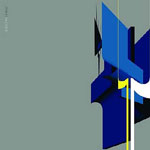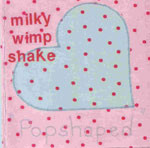Part 2

There’s a similar understanding of the value of genre in Currituck Co’s Sleepwalks In The Garden Of The Dead Room set on Track And Field. Part of a spiritual network of Folk connecting to the likes of Joanna Newsom, Devendra Banhart, Six Organs, James Hindle etc, Currituck’s Kevin Barker is similarly mining traditional Folk veins whilst simultaneously re-contextualising that Folk within the contemporary setting. Which, after all, is what the best Folk music has always been about. So Sleepwalks… is the sound of Barker plucking his guitars and banjos in the vein of John Fahey and Bert Jansch, overlaying it with the skeletal honesty of a voice that calms and cajoles with creaks and cracks in the floorboards. Barker often describes his music as ‘psychedelic Folk’ and it’s a description that makes perfect sense, as it’s a Folk music that meanders within itself, like tracing the lines of a Paisley pattern. It’s a Folk that lifts curtains and peeks behind into the shadows, that clambers into the attic and rummages through dusty old photographs of long forgotten lovers. It’s a Folk that both soothes and sparkles, and it’s a Folk that you should certainly be investigating.
Also on Track and Field is the new album by Herman Düne. Not On Top is the Paris based Swedish / Swiss trio’s sixth album, though I admit to having previously lost interest after I found their Turn Off The Light debut didn’t match the pleasures of the ‘Between The Little Houses’ 7”, which I loved. Not On Top however has made me re-evaluate, and whilst I’m still not totally sold on that debut, I am nevertheless considering investing in some of those four albums that punctuate the story between then and now. The sound of now is certainly one worth applauding, the more so since it is augmented by the bass playing and backing vocals of the gorgeous Julie Doiron. Doiron lends the songs a depth and dynamic that I think was lacking in the Herman Düne of old. Some will no doubt prefer the more stripped back bass-less Folk purity of the previous records, but personally I find the groove that emerges on songs like album opener ‘Little Wounds’, ‘Eleven Stones’ and ‘You Could Be A Model, Goodbye’ to be utterly charming, oddly addictive and just mildly redolent enough of the Velvets to be intriguing but without falling into r’n’r cliché that so many do. Not On Top sees Herman Dune, like the aforementioned Kevin Barker, transfiguring Folk structures into new forms. It sees Herman Düne re-contextualising the language (musical, literary, aesthetic) of Folk and the mythic Beat revolutions through 21st Century European eyes. That it’s done with wit, warmth and inventiveness means that Not On Top is an album you should be tracking down post-haste.

Speaking of Hood, I’ve been listening to their The Negatives EP recently. I’d lost touch with Hood, but this EP is persuading me that I ought to check out their recent Outside Closer album from which the title track of the EP is lifted. On this evidence Hood have navigated the turbulent seas of post-Post-Rock with aplomb, landing on the shores of an island filled with strange sculptural offerings to the Gods of purposefully meandering sound. Hood are the sonic equivalent of a Richard Long walk across Iceland, all the while humming some snippet of memorable Pop hook. I really should reacquaint myself.
Similarly, I’d lost touch with Four Tet over the years. I don’t know what they’ve been up do, but I imagine it has involved being hunkered down in basement studios playing with technology and collaging glitches and beeps and beats. Certainly their ‘Smile Around The Face’ single suggests as much, and whilst I’d quite likely have been seduced by this kind of thing five or six years ago, it leaves me somewhat cold today. Which probably says much more about me than it does about Four Tet, but whatever.
Now, I cannot believe that Autechre have been around for fourteen years and are releasing their eighth album. Way to make a guy feel old. Whatever, it is tempting to come at this release with the old Kevin Pearce approach and say that the new Autechre record sounds like an Autechre record, and leave it at that. In many respects of course that is all you need to know, and I guess it’s to Autechre’s credit that they can still please me whereas an act like Four Tet fail to tease. Untilted then takes the blueprint and tweaks it, moves it on in subtle ways, notably by injecting more of a sense of urgency, but also with more depth and breadth, conjuring an ever wider range of potential stimuli and impressionistic reference points. The sound of Autechre, here and elsewhere is the sound of a Techno universe simultaneously expanding and imploding all at once whilst being rooted in the reality of the world we inhabit and consume on a daily basis. So the sound of Autechre reaches into the flux of other worldly reverberation whilst specifically suggesting the everyday. It’s a difficult path to tread, but Autechre do it with perfect poise. Eight albums in, they still sound fresh, intriguing and relevant. Growing old never sounded so fascinating.

On a different tack entirely is the Popshaped set
by Milky Wimpshake on Fortuna Pop. Now I’d heard of this band before
and always kind of liked the name, but I’d never indulged until now.
I’m
glad I did. Popshaped is a collection of 18 tracks apparently arranged
to reflect a typical live show, and features a blend of Wimpshake originals
with a peppering of inspired and inspiring covers. Opener ‘Boxing Day Blues’ sadly
is not one of those covers, but is rather a nifty downbeat acoustic pondering
of the post-Christmas day in question. Reference to Phil Ochs obviously earns
the song bonus points. Other favourites amongst the Wimpshake originals include
the comic book paean of ‘Spidey’ (though I obviously prefer the Barman canon),
the sparkling keyboard and guitar driven ‘Don’t Get Down (Get Even)’ and the
madcap thrash of ‘Milk Maid’. It’s the wonderful medley of covers that blends
Daniel Johnston’s ‘True Love Will Find You In The End’ with Jonathan Richman’s ‘Don’t
Let Our Youth Go To Waste’ that steals the show, however. Here Milky Wimpshake
replace their Sportique / Buzzcocks guitar fuzz with the more ethereal sonic
assault of Galaxie 500, and so oddly it become a cover of Galaxie 500 covering
Jonathan Richman with Daniel Johnston slipping in the front door. It’s
marvellous in any event, and almost worth the admission price alone.
And finally, what about Plans And Apologies? I didn’t catch their Torn Out
Pages From The Middle Agez debut, but I’m wishing I had because their
new The
Tree Dee Pee EP on Artists Against Success (home of the very wonderful
MJ Hibbert And The Validators and The Frankie Machine, amongst others) is something
of a gem. Opener ‘Eggbound Mutebone’ bristles like a grinning teenager fishing about for meaning in the world but finding only nonsense. “If I’ve no faith in my bus timetable, how can I have faith in the Holy Bible?” ponders singer Mallard The Wonderdog (yes, really!) and you have to wonder if he has a point. The sub 50 second ‘Nabbo’ meanwhile yelps and squeals like early Wolfhounds on heat, and that’s no bad thing of course, whilst set closer ‘The Paperclip Key’ is
a haunting slow-core ballad that floats through the air like a spectral presence
wielding a taser. The whole EP bristles with the spirit of a band revelling
in exploring ideas, of a group forging a varied and multi-layered identity.
It makes for a thoroughly enjoyable experience and makes me eager to hear more.
© 2005 Alistair Fitchett